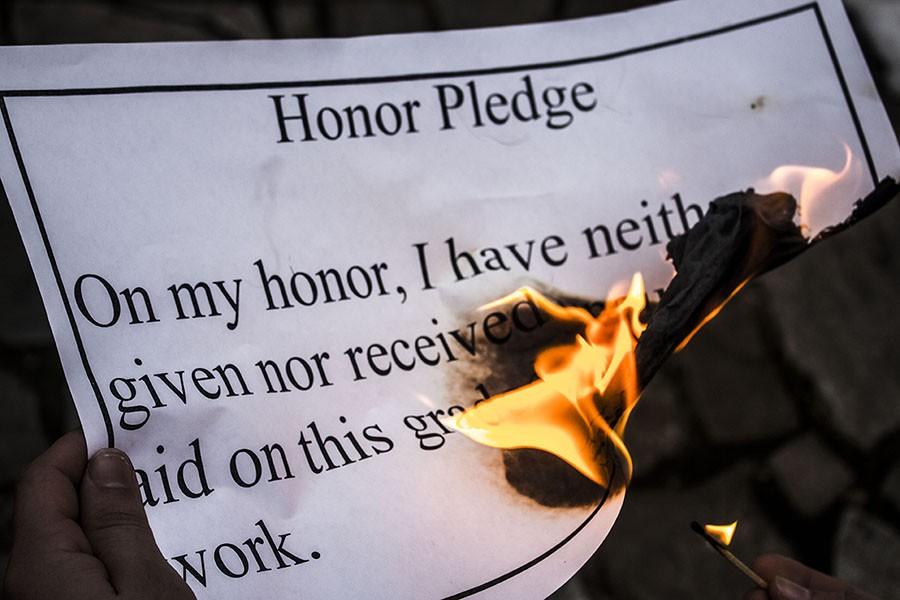Patriot Perspective: Current honor code is too lenient to stop cheating
The honor code is too weak to stop the trend of cheating in high schools. In order to keep JC honest a, new, tougher honor code should be adopted.
With answers scribbled on his palms, a student furtively looks over his shoulder to double check that his teacher hasn’t caught him cheating. His classmates realize that he’s violating the Honor Code, but they ignore his blatant cheating and keep taking their tests.
When the class gets their tests back, this student receives a perfect score, while his classmates barely pass.
For many students, this is a familiar scene, whether they are the student cheating or the classmate that fails. Honor Code violations – ranging from plagiarism on a term paper to copying homework – are common at JC, and the student body needs to hold itself accountable to stop this epidemic of deceit.
This will require more than an individual effort on behalf of the students who care about being honest. Cheating is hard to deal with because it is taken so lightly in so many ways. Minor infractions such as copying five-point homeworks pave the way for copying on quizzes and then, in some cases, to copying test and exam answers.
Although the administration has already made it clear that cheating will not be tolerated, and it is punished severely, the culture of dishonesty common in so many high schools and colleges still exists. The problem is that the intense pressure of competing against so many future college applicants leaves students feeling understandably desperate.
The frequency of cheating scandals at America’s top institutions, coupled with tips that homework answers are just online, makes students feel as if by not cheating, they have no way of keeping up. This problem is not particular to JC, and is not as severe as in many places, but it does exist and needs to be dealt with.
In order to combat such an ingrained habit, a massive culture shift is necessary. This shift could be brought on by a much more strict honor code, which displays trust in student character, and vastly strengthens the punishment for infractions. Policies allowing for take home tests and unproctored tests would allow class time to be totally devoted towards lessons and review. It would also demonstrate a trust for students, which would, in turn, demands respect back.
Such honor codes are uncommon, although they do exist at colleges such as Washington and Lee and UVA. By placing trust in students as opposed to monitoring them, the assumption is that they will be honest. Although that may sound naive, expectations matter and often shape the ways in which people act.
The other aspect of this honor code is that it is absolute. Because of the high level of trust, students must be held to an equally high level of honesty. Any infraction would result in immediate expulsion with no questions asked. JC needs to make it clear to everyone in the community that cheating or any other form of dishonesty is blatantly unacceptable.
This policy would also punish those students who witnessed cheating but did not report it. By protecting dishonesty, they have in turn perpetrated it and should be punished as well, although not as severely.
Such a change would be monumental for shaping the characters of JC alumni as well as our image. By taking a much firmer stand against cheating and dishonesty, we can attract the type of students who are interested in our mission of shaping tomorrow’s leaders, morally and intellectually.
Obviously, instituting a stricter Honor Code will not be an easy change and cannot be done at once. The new honor code should be phased in by beginning to punish students who witness cheating. This is a small way to institute such a drastic change smoothly. The no proctor policy can be slowly added as well by suggesting to teachers that they allow small tests and quizzes to be taken at home be.
By slowly instituting such a large change, dishonest students can be given a new chance to stand up to the lofty expectations with which they are presented.
A culture of integrity creates a bond of trust between students. In an environment of honesty, every student can be proud of the grade they receive and can respect their peers’ accomplishments as well.
Students should be able to develop their own Honor Code. If students are able to create one themselves, it will allow the students to be more involved in making the school a place that fits their needs.
Giving input will make the students want to remain loyal to something that they created. Instituting their own rules invokes a sense of moral responsibility to follow and hold their fellow peers accountable.
Not only is a student-made Honor Code a benefit to the students, it is also a benefit to the administration. They will know what the students find important and value, providing a foundation for administration to build upon.
Following the Honor Code creates this culture of integrity. It teaches students the lesson that their word means something and that they need to be honest to succeed in life.
The Honor Code needs to be followed, not just because it helps students in their own lives, but because a school full of honest students creates an environment where students can take pride in their work and trust that others are putting in as much effort as themselves.




